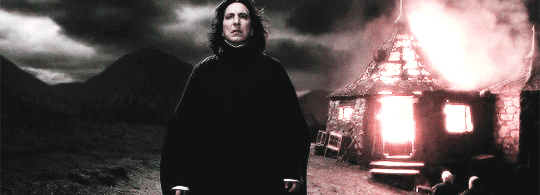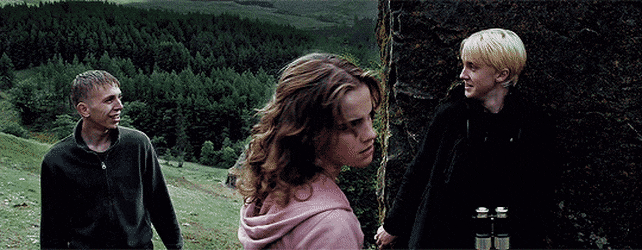Hidden in the darkest recesses of the mind shines a tiny light. Our brains tell us this glow illuminates our potential for happiness and must be fed. That tiny light is optimism, and it’s really a horcrux that must be destroyed. Seriously…kill it.
Are you an optimist or a pessimist? Optimists see everything through a rosy sheen of sunshine and sparkles. Pessimists see the world through a gloomy haze of rain and fog. So, which is the right way to see the world? Optimism is easily the better choice because it leaves you more open to joy and delight, right?
Wrong.
Why? Because they are two roads leading to the same destination. Let’s go to Harry Potter for an example; this is similar to comparing being a Gryffindor or a Slytherin. One house is brave and honorable while the other is undeniably treacherous and underhanded. Right? Now go re-watch The Deathly Hallows Part 2 and tell me Snape*, master of all things Slytherin, isn’t the bravest damn hero that ever lived.
Two opposing paths with shared outcomes. You would expect the heroes and villains here to be very clearly defined by their actions and they aren’t. What does this tell us? That being primarily driven by one point of view, like bravery, intelligence, loyalty, or ambition does not preclude us from having shared results.
Optimism and pessimism are just like this. Both begin with varying intentions, but each leaves you wanting something at the end. Expecting certain outcomes, reactions, or meanings can quickly turn down the wrong road and lead to an inability to appreciate the journey. So, how can optimism, in all its shiny Patronus glory, be bad? Easy, that Patronus is actually a Thestral because your optimism has mismanaged your hope to the point that you have watched it slowly die.
“So, Preston, what you’re saying is that optimism is a bad thing? You sound like a pessimist, definitely a Slytherin…”
The idea of hope and everything that comes with it is wonderful. However, we have been conditioned as a society to see optimism and hope as the same thing. Optimists believe the world is inherently a good place with generally good people living in it. Since no one is the villain in their own story, optimists believe they fit into this idealized world because they are also good.
But what happens when these external and internal expectations do not perfectly align to meet this perceived reality?
Depression? Anxiety? Regret? Anger? How long before the disappointment begins to eat away at you? Pessimism is a state of being that may be negative or dreary, but failed optimism can have severe long-lasting effects that sneak up on you.
Let’s get ahead of that outcome by reframing the dependence on optimism into a separate entity that is more consistently attainable and rewarding – hope. We will begin by reviewing some synonyms for both words.
Optimism: Anticipation, Certainty, Easiness, Enthusiasm, Expectation, Idealism, Sureness, Trust
Hope: Ambition, Aspiration, Confidence, Desire, Faith, Goal, Prospect, Wish
There is overlap here, but optimism focuses on absolutes while hope leans on possibility. Optimism is solely about outcomes, where hope provides room to appreciate the journey. Optimism is more likely to demand a specific set of circumstances is met, while hope leaves space for deviation from a specific version of “good”.
With all this said, what does reframing your optimism as hope provide you? I believe a greater ongoing potential for contentment in both personal and professional areas of your life.
“Ok Preston, enough waxing poetic about how you feel about feelings. How does this affect my lazy talentless co-workers and crazy idiot clients?”
Like hope, optimism is not an emotional response – it is a way of seeing things – a pretty word for expectations and judgement. Optimism is a cause, and the emotional output is the effect. That emotional consequence is what affects us and distorts our worldview enough that we cannot even see when it begins to spill into our personal and professional relationships, for better or worse.
With this distinction in mind, let’s look deeper at your “lazy talentless co-workers” and “crazy idiot clients”.
The classic saying goes, “Expectations are premeditated resentments.” When our optimism expects a certain outcome without proof that outcome is possible, we are setting ourselves up to feel resentment.
For example, most of us are reasonable enough to know that expecting a pile of cash to materialize out of thin air is a bit unrealistic. Yet we have all been guilty of assuming that the people we work with will interact with us the way we expect because our optimism knows this is the way to deliver results that we value.
Your optimism is tricking you into believing everyone holds the same expectations and values. When they inevitably don’t show this in the exact same way you demand, your disappointment can quickly turn into resentment. Let’s step back and review some synonyms, this time for resentment.
Resentment: Animosity, Annoyance, Bitterness, Cynicism, Fury, Irritation, Outrage, Passion, Rage
Where do we get the sense of power to think that expecting others to behave the way we want them to is a right? Where do we get the entitlement to then get resentful when someone falls short of these expectations? How can optimism that people perceive as so good bring you to a place where fury, bitterness, and rage are the dominant emotions? Easily…I have been there myself and others have had their own experiences.
In my career, I learned the hard way that my optimism (expectation) was the primary cause of my resentment at work. I had and have a great job that I love, and yet I spent years being solely responsible for making it difficult because of my optimism.
I believed optimism was a call for excellence. When others did not meet my expectations, I knew that my work suffered, my team suffered, and my clients suffered because we were not living up to my perfect reality. I was 100% correct that everyone suffered, but not because my expectations were not being met, but due to my toxic optimism poisoning everything it touched.
The funny thing about setting yourself up to be constantly let down is that the world will oblige you. I held onto the notion of how things should be, and each invalidation of that optimism slowly took away the thing that brought me the most joy professionally, helping people through my creativity. Instead, I became a catalyst in creating more problems – abandoning what I valued most for the sake of trying to shape the world into an idealized fantasy.
It was years before I came to the eventual understanding that my optimism was a virus. I learned to hope for outcomes and try to steer towards them without expectation. I found that the expectations I had before could be exceeded when I was not holding people back with my judgements and resentment. I was able to better connect with my team and clients, building a foundation of trust and shared hope that allowed us to learn and evolve with each other, even in the face of disagreements or anger.
The singular most important revelation in all of this was that my clients were not paying to meet my expectations, they were paying to make sure I met theirs. Spending less time focusing on judgement and more time letting my team’s natural abilities lead the charge was all I needed. There was no need to be right, wrong or otherwise, just the hopeful intent and dedicated follow through to deliver something astounding, even if the path to the finish line was a bumpy ride.
Optimism never starts as “he who shall not be named”, but it needs to be managed so it doesn’t get there. The human mind is an incredible machine, but it is a finite resource. When we spend that resource on expectations and resentments, we have fewer resources left to live up to the way we see ourselves.
Reframing optimism as hope is not about the blame game, it’s about personal awareness and giving hope a chance. Save the optimistic expectations for things that can actually bring positive change; your health, your charity, your boundaries, and self-care. Leave the rest of it to hope. Focus on being fulfilled by the wonder of the journey and potential for more. Live in the moment of each situation and appreciate the little pieces that make you love what you do to keep your passion alive and strong. You will be better for it and you will be helping to create the world of good your optimism saw in the first place.
Mischief managed.
”It does not do well to dwell on dreams and forget to live.
Albus DumbledoreProfessor, fictional character, & low-key villain




